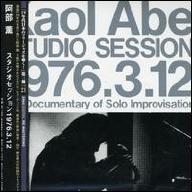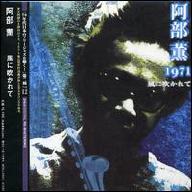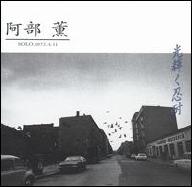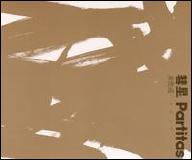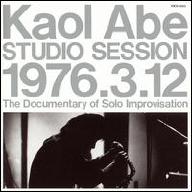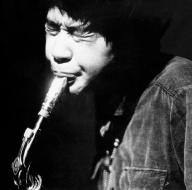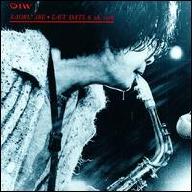At any rate, this performer's lifestyle is said to have been soaked with liquor, stuffed with drugs, and sniffing with loneliness and tragedy. It had enough of these elements to inspire a movie treatment, nonetheless, so fans of Japanese free jazz have the option of searching for the film #Endless Waltz, which supposedly tells the tale of his marriage to the writer Suzuki Izumi -- who had even more problems than he did, if the screenplay is to be believed. In the decade that he didn't quite finish out, the '70s, some fans feel his talents sizzled with the inevitability of a roaring fire that is repeatedly doused with filthy water. If this was the case, he certainly shouldn't be blamed personally for following a lifestyle that many believe to be required for such a career. Dexter Gordon performed brilliantly after drinking entire bottles of vodka, and several acknowledged free jazz masterpieces were recorded by players whipped out of their minds on LSD.
Some of the lack of appeal of Abe's later material has got to come not from the perception that he is out of it but from his introduction of other instruments, including the dreaded harmonica and crudely played guitar. Historically, there are few known cases of saxophonists being praised for adding other instruments into their arsenal, so any critical about-face on this issue can be considered an important development in itself. Other Japanese music scholars have praised the later-Abe material and his use of diverse instruments, but even they seem to feel his work on the alto saxophone has never been equalled. One thing is for sure, no matter how extremely noisy the Japanese music scene has gotten, it has yet to produce another reed player as good as this one. His solo sets were said to be the peak of his creative form, but he also took advantage of opportunities to record with the master American free jazz drummer Milford Graves and the British father of free improvisation, guitarist Derek Bailey. Abe contributes immensely powerful playing to these two completely different contexts. He also can be heard on recordings with other Japanese free players, such as the Aida's Call album, in which he holds forth with dynamic trumpeter Toshinori Kondo and virtuoso bassist Motoharu Yoshizawa, yet another booze casualty. One of Abe's earliest groupings was the New Directions duo in 1970 with Masayuki Takayanagi. ~ Eugene Chadbourne, Rovi


